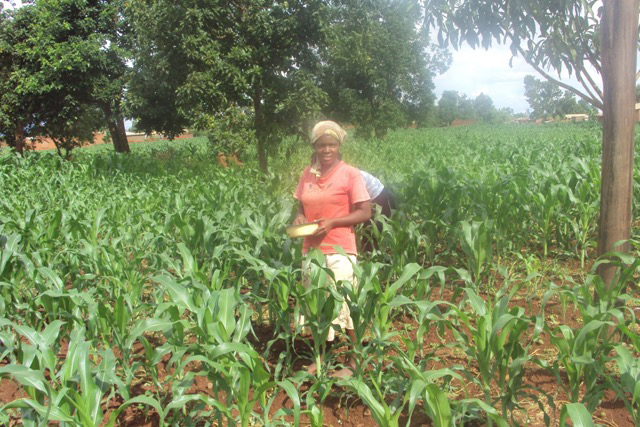FSP’s study of the long-term benefits of fertiliser subsidies program in Malawi
Ricker-Gilbert and Jayne article "Estimating the Enduring Effects of Fertiliser Subsidies on Commercial Fertiliser Demand and Maize Production" in the Journal of Agricultural Economics (2017), was one of the journal’s top 20 most downloaded recent papers.
The 2017 article by Jake Ricker-Gilbert (2011 AFRE PhD graduate and Associate Professor at Purdue University) and Thomas Jayne (AFRE University Foundation Professor), Estimating the Enduring Effects of Fertiliser Subsidies on Commercial Fertiliser Demand and Maize Production: Panel Data Evidence from Malawi, published in Journal of Agricultural Economics, was one of the journal’s top 20 most downloaded recent papers. As of year-end 2017 this article received 849 downloads.

Photo: Malawi farmer fertilizing her field.
Input subsidy programs have been one of the most contentious policy issues in African agriculture.
Prior to Ricker-Gilbert and Jayne’s study, analyses of input subsidy programs were confined to measuring program effects over a one‐year period. The evidence from these studies indicated that African subsidy program impacts were generally modest. But many working in this area suspected that it might take multiple years for input subsidy programs to generate their full impacts. Ricker-Gilbert and Jayne’s article estimates the potential enduring and cumulative effects of Malawi’s decade-long fertilizer subsidy program on smallholder farm households' demand for commercial fertilizer and maize production over time.
Ricker-Gilbert and Jayne’s findings show that the long-term effects of the Malawi subsidy program remain quite limited.
Household maize production and annual farm incomes rise for the period during which households receive the subsidy (which may be for as many as 4 or 5 consecutive years) but then tend to revert back to their pre-subsidy levels within one or two years after they “graduate” from the subsidy program. The article concludes that government efforts to help farmers raise soil fertility can make using inorganic fertilizer more profitable and sustainable for smallholders in sub‐Saharan Africa and thereby increase the cost‐effectiveness of input subsidy programs.
The Government of Malawi has been exploring ways of revising its fertilizer subsidy program to be more effective and sustainable.
Ricker-Gilbert and Jayne’s findings, along with other FSP research, support other FSP recommendations to the Ministry of Agriculture. See how FSP activities in Malawi are supporting the potential re-design of Malawi’s fertilizer policy reform process: Soil Health Issues Dominate Fertilizer Policy Consultations.
FSP Policy Briefs and Research Papers on Input Subsidy Programs in Africa:
Joseph S. Kanyamuka, Flora J. Nankhuni, Thomas S. Jayne and Moses W. Munthali. May 2018. Making Fertilizer Use More Effective and Profitable: The Role of Complementary Interventions, Feed the Future Innovation Lab for Food Security Policy Research Brief 60. East Lansing: Michigan State University
Jayne, T. S., Mason, N. M., Burke, W., and Ariga J. 2017. Taking Stock of Africa’s Second-Generation Agricultural Input Subsidy Programs, 2000–2015, Feed the Future Innovation Lab for Food Security Policy Research Brief 34. East Lansing: Michigan State University
T.S. Jayne, Nicholas J. Sitko, and Nicole M. Mason. 2017. Can Input Subsidy Programs Contribute to Climate Smart Agriculture? Feed the Future Innovation Lab for Food Security Policy Research Paper 87. East Lansing: Michigan State University.
Thomas S. Jayne, Nicholas J. Sitko, Nicole M. Mason, and David Skole. 2016. Can Input Subsidy Programs Promote Climate Smart Agriculture in Africa? Feed the Future Innovation Lab for Food Security Policy Research Brief 16. East Lansing: Michigan State University



 Print
Print Email
Email